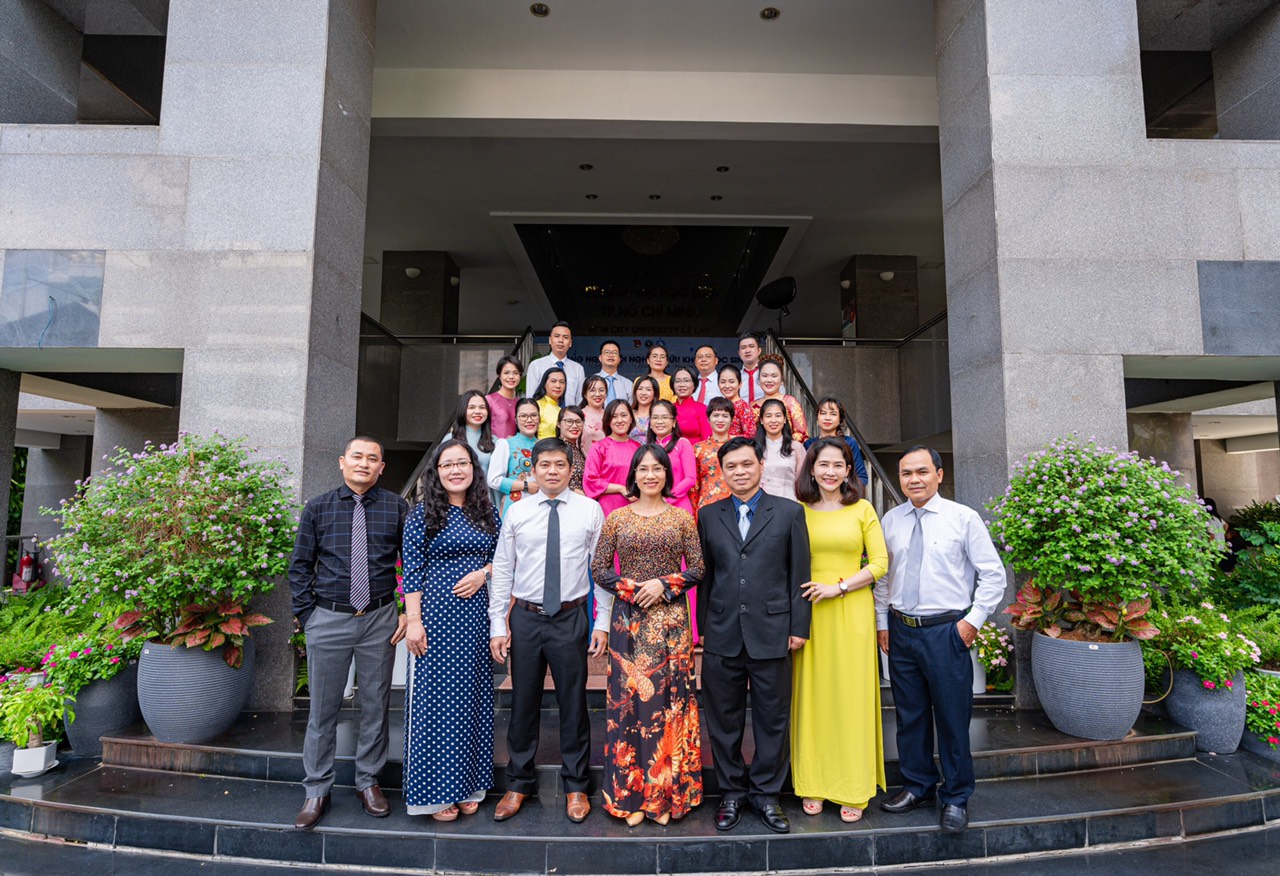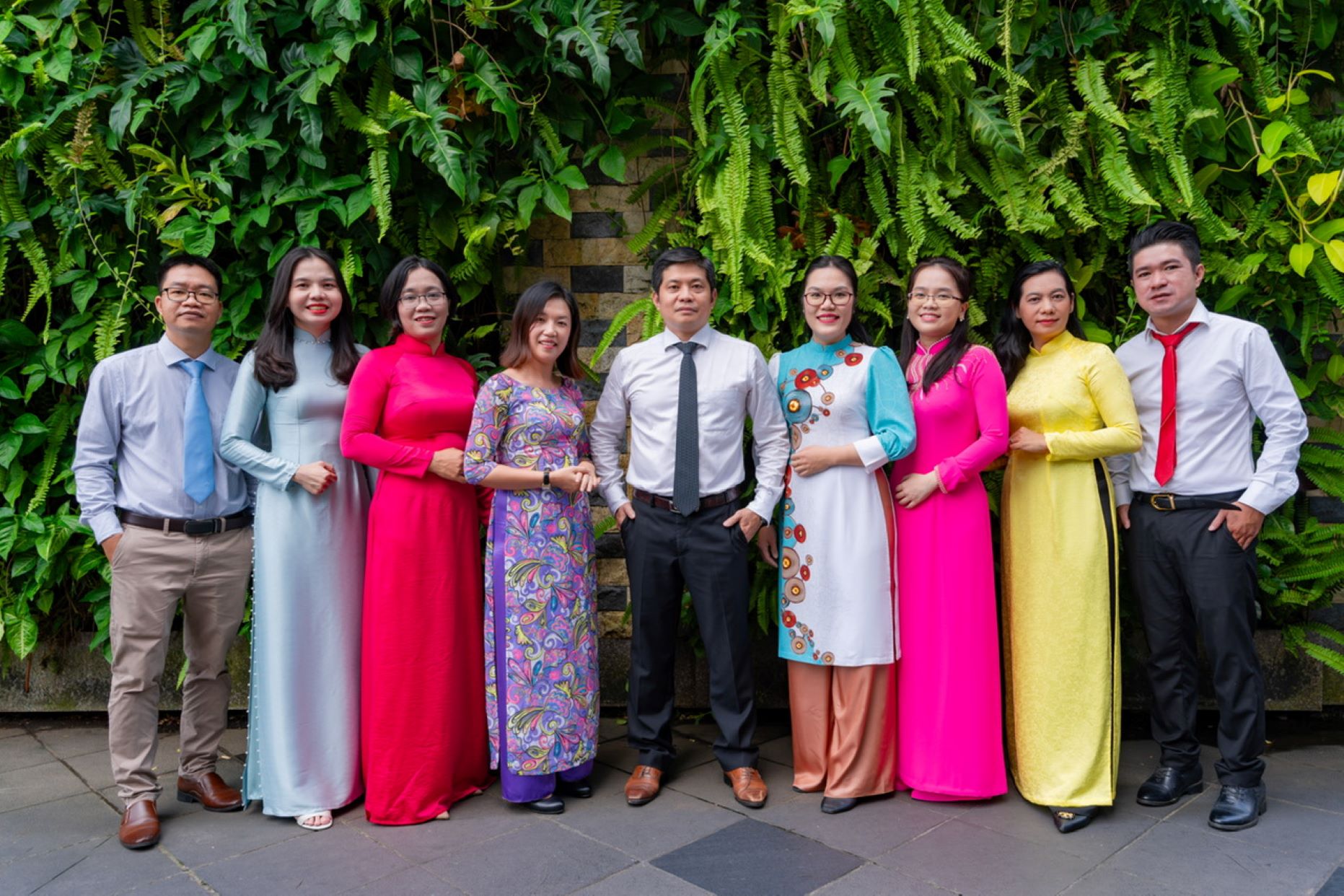About the Criminal Law Faculty, Ho Chi Minh City University of Law
The Criminal Law Faculty was established in July 1996 - formerly the Faculty of Justice.Currently, the Criminal Law Faculty is in charge of 3 subjects: Criminal Law, Criminal Procedure Law, and Criminology. As of September 2023, the Criminal Law Faculty encompasses 33 lecturers and 01 assistant faculty (including 02 Associate Professors, 11 Doctors, 04 PhD students, and 16 Masters).

The Faculty assumes responsibility for knowledge-based administering and teaching mandatory and elective courses in undergraduate and postgraduate training programs (including master and doctoral training in criminal law and criminal procedure law).
The Criminal Law Faculty is one of the top-notch training divisions in criminal justice and criminology, producing proficient human resources at undergraduate and postgraduate levels; a center for research on legal criminal science, criminal procedure, criminal execution, and criminology, ardently contributing to the progress of the country's legal science along with the regional and international integration. The educational philosophy of theCriminal Law Faculty is “Knowledge mastering – Justice serving”. The objective of the Criminal Law Faculty is to train undergraduates with sufficient moral virtue and the capacity to work in agencies and organizations i.e. Courts, Procuracy, Investigation agencies, Enforcement agencies, Law firms, and Law Offices,... Masters and Doctors in criminal law and criminal procedure law trained by the Faculty, besides exhibiting law enforcement knowledge and skills, possess the capacity to organize and guide scientific research activities within the criminal justice realm.
In order to successfully implement the educational philosophy and achieve the aforementioned objectives, the Criminal Law Faculty always zeroes in on ameliorating the quality and effectuality of training and scientific research activities. Lecturers constantly innovate the lesson content, teaching, and scientific research methods.The Faculty has compiled plenteous syllabuses such as Criminal Law Textbook (General Part), Criminal Law Textbook (Crimes Part), Criminal Procedure Law Textbook, Criminology Textbook, and Psychology of Justice Textbook. In addition, to meet the demand of teaching and learning, the Faculty has also compiled ample documents incorporating Guideline materials for studying Criminal Law, Legal documents for guiding the application of criminal law, and Guideline materials for studying Criminal Procedure Law.Faculty lecturers have accomplished many scientific research projects at school and ministerial levels; published many scientific articles in prestigious domestic and international journals; instructed undergraduates in scientific research with brilliant results,… Many lecturers of the Criminal Law Faculty participate in legal consulting activities and join the Jury of the Ho Chi Minh City People's Court to enhance practical knowledge for research and teaching.
Not only does the Criminal Law Faculty attract students with its exuberant and intriguing subjects, but it also has a team of lecturers with strong expertise, enthusiasm, and avid support for students in their studies and scientific research. The students of the Faculty, after graduating, have developed their professional abilities while working in judicial bodies as well as other agencies, being exceptionally appreciated for professional capacity and ethical conduct.They are marginally climbing their career ladders.This is a great honor and abundant source of encouragement for the Criminal Law Faculty.
Introduction to the Divisions of the Criminal Law Faculty, Ho Chi Minh City University of Law
- Criminal Procedure Law Division:

+ As to teaching activities:
The Criminal Procedure Law Division is in charge of teaching the following modules:
Criminal Procedure Law: This subject provides students with knowledge about: (i) Theoretical issues, tasks, and fundamental principles of criminal procedure law; bodies and persons having competence to perform procedural activities, participants in criminal proceedings; evidence and proof in criminal procedures; preventive and coercive measures; and (ii) Procedures for institution, investigation, prosecution, first instance trial, appellate trial, cassation, reopening; and (iii) Special procedures.
Criminal Judgments Execution Law: This subject equips students with knowledge about the concepts, tasks and principles of the law on execution of criminal judgments; system of competent agencies in criminal judgment execution; legal status of the sentenced person and; procedures for implementing some types of penalties and judicial measures.
Juvenile Criminal Justice: This subject, taught in Vietnamese and English, is common elective of 05 faculties and mandatory for students of advanced quality classes. The Juvenile Criminal Justice module offers students knowledge about theoretical issues relating to criminal justice for juveniles; United Nations standards and regulations on children's justice; provisions of Vietnamese criminal law for people under 18 years old committing crimes; provisions of Vietnam's criminal procedure law on procedures for resolving criminal cases involving people under 18 years of age; provisions of Vietnam's criminal judgment execution law for people under 18 years old.
Criminal Investigation Science: This subject affords students general theoretical knowledge about criminal investigation science; forensic engineering, criminal strategies, criminal tactics; and specific investigation methods for each type of crime.
To boost the teaching quality, teachers of the Divisions typically improve lesson content and indoctrinating methods, update state-of-the-art professional knowledge, and develop detail-oriented teaching skills, focusing on proactive, student-centered, and nourishing learners' abilities.
+ As to scientific research activities:
The Criminal Procedure Law Division has compiled documentation to meet the teaching and learning requirements of the in-charged modules as follows
- Associate Professor, Dr. Le Huynh Tan Duy (principal investigator) (2017), Improving Vietnam's criminal procedure law for people under 18 years old based on United Nations legal framework - Research project with Good grade;
- Associate Professor, Dr. Le Huynh Tan Duy (principal investigator) (2019), Mediation under Vietnam's criminal procedure law - Research project with Excellent grade;
- Master Dinh Van Doan (principal investigator) (2021), Keeping confidential personal information of people below 18 years old under Vietnam's criminal procedure law - Research project with Good grade;
- Master Le Thi Thuy Duong (principal investigator) (pending), Presumption of innocence: Comparative research and recommendation for Vietnam;
- Master Vu Thi Quyen (principal investigator) (pending), Handling of exhibits under Vietnam's criminal procedure law;
- Master Nguyen Phuong Thao (principal investigator) (pending), Asset valuation under Vietnam's criminal procedure law.
Additionally, lecturers of the Criminal Procedure Law Division have published many scientific articles in prestigious domestic and international journals; issued plenteous monographs serving scientific research and training at all levels; and guided many scientific research studentswinning awards at the faculty, school, city, and ministerial levels;…

+ As to teaching activities:
The Criminal Law Division is in charge of teaching the following modules:
Criminal Law – General Part: This subject provides basic theoretical knowledge about Criminal Law such as Criminal Law Concepts; Effect of the Criminal Code; Elements of Crimes; Regulations related to the identification of criminals; Penalties and penalty decisions; Sentence exemption or commutation from criminal liability, etc. On that basis, students might have abilities to identify crimes in specific cases; determine the stage of the crime, the role of accomplices, identify the cases that include criminal liability exclusion, determine the penalty frame, sentence decision and combined decision, determine the limits of allowable penalties to be applied, comment on the decision of the Court.
Criminal Law – Crimes Part: This subject provides knowledge of the State's criminal policy; equips students with methods to approach and master the signs of each criminal group and signs of specific crimes to apply effectively in professional activities; equips students with basic knowledge of determining crimes and deciding on punishment.
Theory of crime determination: This subject systematizes the theory about the elements of crimes, thereby guiding students to practice crime determination skills based on reality cases that are provided by lecturers.
Judicial psychiatry: This subject provides knowledge of psychiatric knowledge, prepares basic knowledge in the process of solving cases related to people with mental illness. Understanding psychiatric assessment activities is also necessary for officials of the justice sector to evaluate the value of psychiatric assessment conclusions.
Forensic examination: This subject provides the necessary medical knowledge to have a basis evaluation of the examination conclusions in a criminal case to properly resolve the case.
Comparative Criminal Law: This subject is taught in English and provides basic knowledge about comparative criminal law, comparing the basic clauses of Vietnamese Criminal Law and the others.
+ As to scientific research activities:
The Criminal Law Division has compiled documentation to meet the teaching and learning requirements of the in-charged modules as follows:
- Ho Chi Minh City University of Law, Dr. Tran Thi Quang Vinh (editor-in-chief) (2018), Criminal Law – General Part Textbook, Publishing House. Hong Duc;
- Ho Chi Minh City University of Law, Dr. Tran Thi Quang Vinh (editor-in-chief) (2021), Criminal Law – Crimes Part Textbook, Publishing House. Hong Duc;
- Associate Professor, Dr. Nguyen Thi Phuong Hoa (editor-in-chief) (2016), Internalization of provisions of the Convention against Transnational Organized Crime, Publishing House. Hong Duc- Lawyers' Association;
- Associate Professor, Dr. Nguyen Thi Phuong Hoa, Dr. Phan Anh Tuan (Co-Editor-in-chief) (2017), Scientific commentary on new points of the Criminal Code 2015 (amended and supplemented in 2017), Publishing House. Hong Duc;
- Authors' collective (2018), Study guide for Criminal Law General Part, Publishing House. Tre;
- Authors' collective (2018), Study guide for Criminal Law General Part for 3 - 4 credit programs, Publishing House. Tre;
- Authors' collective (2018), Study guide for Criminal Law Crimes Part, Publishing House. Tre;
- Dr. Nguyen Thi Anh Hong, Dr. Phan Anh Tuan (Co-Editor-in-chief) (2023), Study materials for Criminal Law, Publishing House. Ho Chi Minh City National University;
- Dr. Nguyen Thi Anh Hong, Dr. Phan Anh Tuan (Co-editor-in-chief) (2023), System of legal documents for guiding the application of criminal law, Publishing House. Ho Chi Minh City National University.
Scientific research activities of the Criminal Law Division are performed in variety forms such as: implementing many scientific research projects at the ministerial and school level; organize seminars and professional meetings to improve and update professional knowledge, teaching skills; continuously improve electronic lesson plans for Criminal Law subjects on PowerPoint software; guide graduation thesis and scientific research topics for students.
To meet the requirements of “students-centered”, lecturers of the Criminal Law Division improve teaching methods and apply advanced teaching methods into practice. The traditional teaching methods are replaced by many new ones such as: self-study based on materials provided by the teacher, working in small groups, solving case studies, and discussing according to the topic suggested by the teacher. In the future, the Division will promote active teaching methods to stimulate initiative and creativity in students, reducing presentation time to focus on student discussion and teamworking to train independent work skills and teamwork skills for students after graduation.

+ As to teaching activities:
The Criminology Division is in charge of teaching the following modules:
Criminology: This subject provides basic knowledge related to the crime situation, the causes and conditions of crime, and the identities of offenders to make crime predictions, and prevention.
Victimology: This subject provides general knowledge about crime victims, the necessity of studying the role of victims with the causes and conditions of crime. This leads to determining the meaning of victim research in crime prevention.
Fighting and preventing certain crimes: This subject provides crime prevention knowledge in all social and legal aspects. Learners can apply the knowledge to organize crime prevention activities in their local areas or communities to reduce crime in society.
Judicial psychology: This subject provides psychological knowledge of activities such as investigating activities, trial activities, defense activities, trial activities, and educational training activities for offenders. In addition, the subject is also providing knowledge about the psychological characteristics of who conduct proceedings and participate in proceedings in investigation, trial, and rehabilitation activities such as investigators and prosecutors, judge, people's jury, defense counsel, accused, defendant, offender, witness, victim. Learners can apply the knowledge to solve criminal cases, educate and rehabilitate offenders, and practice defense.
Theory of crime prevention: This subject provides in-depth knowledge of crime prevention such as crime prevention measures, evaluating the effectiveness of crime prevention, and advanced theories of crime prevention in the world. This help learners can refer to develop Vietnamese crime prevention measures.
Theory of hidden crimes: This subject provides in-depth knowledge of hidden crimes such as identifying and classifying hidden crimes in practice, determining the level of hidden of crimes, and predicting the hidden situation of some of the most common and dangerous crimes and prevention measures. Victimology: The course supplies to postgraduates theoretical and legal issues about victims, characteristics, and types of victims of crime; the position and role of victims in crime prevention, criminal policy and the justice system; victims compensation issues, supporting for victims... Besides that, the subject also helps learners to get in-depth knowledge about victims of crime from a prevention perspective in relationship to criminal policy and the justice system. This supports learners to apply the law in preventing crime from the victim’s aspect as well as solving criminal cases and protecting victims.
Preventing corruption crimes in Vietnam: This subject provides in-depth knowledge about the situation of corruption crimes in Vietnam in the past and present, identifying causes and conditions, researching the identities of offenders, forecasting corruption crimes in the near future and developing measures to prevent corrupt criminals.
Preventing drug-related crimes in Vietnam: This subject provides in-depth knowledge about the situation of drug-related crimes in Vietnam in the past and present, identifying causes and conditions, researching the identities of offenders, forecasting drug-related crimes in the near future and developing measures to prevent drug-related crimes.
+ As to scientific research activities:
Criminology Division has compiled documentation to meet the teaching and learning requirements of the in-charged modules as follows:
- Ho Chi Minh City University of Law, Dr. Vo Thi Kim Oanh, Dr. Le Nguyen Thanh (Co-editor-in-chief) (2013), Criminology Textbook, Publishing House. Hong Duc (currently in the process of revising and supplementing);
- Dr. Le Nguyen Thanh (editor-in-chief) (2016), Study guidebook for Judicial Psychology, Publishing House. National University.
In addition, many school-level scientific research projects of the Criminology section have accepted, typically:
- Dr. Le Nguyen Thanh (principal investigator) (2004), Fighting to prevent sexual abuse of minors in the southern provinces of Vietnam;
- Dr. Nguyen Huynh Bao Khanh (principal investigator) (2012), Protecting the rights of victims of child sexual abuse from the perspective of human rights;
- Master Le Thi Anh Nga (principal investigator) (2022), Causes and conditions of child sexual abuse crimes from the perspective of crime victims ;
- Dr. Nguyen Huynh Bao Khanh (editor-in-chief) (2016), Preventing some drug-related crimes in Ho Chi Minh City, Publishing House. Ho Chi Minh City National University.
Currently, lecturers in the criminology section are researching and writing other monographs to serve teaching and researching tasks.
- Lecturers have many research articles in prestigious journals such as Vietnam Journal of Legal Science, State and Law Journal, Jurisprudence Journal, People's Court Journal, Procuracy Magazine…
- Lecturers have guided many postgraduates and students to complete master's theses and graduation theses; successfully guided many students in scientific research topics to achieve good results, and won awards at the department and school level, and compete at the city level.
The Criminology Division constantly improves subject content to meet practical requirements of crime prevention. Meanwhile, the new teaching method is focused to increase the active attitude of students in researching the subject by themself with lectures’ direction. Lectures provide for students a system of suggested research questions, subject review questions, and introduce other learning materials related to the subject. In the future, members of the section will focus much more on writing books and reference materials for subjects to adapt better the learning needs of students./.